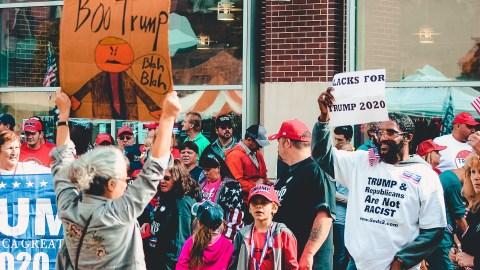Many Americans are actually centrists—in theory, anyway

Photo by Rosemary Ketchum from Pexels
- A new study finds that Americans aren’t as politically polarized as you might think.
- Respondents generally agreed on the issues of climate change, free speech, and the value of international agreements.
- The study also found that majorities want a smaller government that provides more services.
If you haven’t been living under a rock for the last few years, you might notice that the United States seems politically polarized lately. There is widespread disagreement about major issues, some rather nasty rhetoric going around, and some debate over the nature of reality.
While this seems pretty definitive, political scientist William A. Galston argues that these differences are not quite as vast as they seem and that the American center is much, much larger than people are giving it credit for.
The study
Glaston, in an op-ed published in The Wall Street Journal, explains the findings of a just-published survey undertaken by The New Center policy institute.
The findings of the study suggest that the American center is more extensive than most people would expect, with 43% of survey respondents placing themselves there when asked to put themselves on a left-right spectrum. Amongst those who identify as independents, a full 60% of them opted for the centrist label.
On the other hand, 65% of Republicans identified themselves as being on the right, with only 27% of them claiming to be in the center. Among Democrats, 42% of respondents claimed to be on the left. Another 42% of Democrats identified as centrists. The study suggests that the elected members of the two major parties are more polarized than the people they represent.
The study also shows that there is broad agreement on several issues, with respondents agreeing on the need to fight climate change, work with other countries to reduce nuclear stockpiles, and on the value of the freedom of speech.
How does this explain what we see in the election so far?
The finding that “42% of Democrats identify with the left, and the same share with the center” does explain the current standings of the Democratic candidates reasonably well. A look at the most recent polls shows that there has not yet been a break for any one candidate and that voters are still spread over several choices with a diverse range of opinions.
If one treats Warren and Sanders as being the candidates of the left-wing of the party and takes Biden and Buttigieg to be more representative of the American center, the numbers in the study show up rather clearly.
At the same time, the finding that a majority of Republicans identify themselves as being on the right would help explain why the centrists currently running against Trump for the 2020 Republican Party nomination are getting little traction—the votes to get them over the line don’t exist.
The study also touches on points raised by Dr. Robb Willer and Jan Voelkel in The New York Times. The scientists argued that sociological data supports the idea that presenting progressive policy proposals using centrist or even conservative rhetoric increases support from study participants, further suggesting that there is a capacity in the United States for a board agreement on certain policy issues despite our seeming partisanship.
What this study misses
This study, as explained by Mr. Glaston, does leave a few questions unanswered and has a few glaring issues.
First of all, asking people if they consider themselves centrists is not proof that they hold positions that are actually in the center of mainstream political opinion or would vote for a centrist candidate any more than how North Korea officially being the “Democratic People’s Republic of Korea” makes it democratic or a republic. Centrist is a very loosely defined term.
The study also found that majorities of respondents both support a smaller government and want that smaller government to provide health care and income for the retried, protect the environment, protect public health through more regulations, and introduce more robust customer protections.
Where that puts the actual consensus is anyone’s guess. What this apparent contradiction means for the robustness of the opinions expressed by the respondents is equally in the air.
Glaston also admits to the existence of counterexamples to his rosy thesis when he explains that “polarization remains strong” on issues relating to same-sex marriage and the right for LGTBQ individuals to go about their business without facing discrimination. It may be telling that these, very concrete and easily defined, issues inspire polarization while the vague idea of “doing more” in healthcare is widely endorsed.
The study itself also shows considerable polarization being visible on the issue of gun control, another issue with clear and obvious implications.
Despite the potential faults with the study, the claim that there is more agreement on many political issues than many Americans think remains true. In today’s highly polarized and increasingly tense environment, the idea that there are some issues where a majority or near majority of voters are agreed is refreshing.





